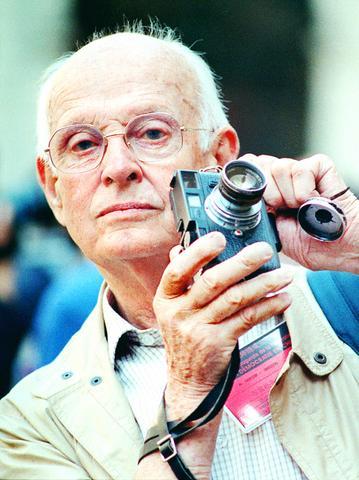Legendary photographer Henri Cartier-Bresson, who traveled the world for more than a half-century capturing human drama with his camera, has died, the French Cul-ture Ministry said. He was 95.
Cartier-Bresson shot for Life, Vogue and Harper's Bazaar and his work inspired generations of photographers. Cartier-Bresson became a French national treasure, though he was famously averse to having his own picture taken or to giving interviews.

PHOTO: REUTERS
A statement from his family and the Magnum photo agency, which Cartier-Bresson co-founded, said he died on Tuesday and a private funeral was held on Wednesday.
Paul Bruton, a Magnum spokes-man, said he had died at home in Cereste in southeastern France, and was buried in the nearby Alpes-de-Haute-Provence region.
French President Jacques Chirac said: "With him, France loses a genius photographer, a true master and one of the most gifted artists of his generation and most respected in the world."
Whether recording the funeral of Mahatma Gandhi in India or Henri Matisse at home, Cartier-Bresson sought to render the feeling of the moment with his distinctive classical style and penchant for geometrical composition.
"In whatever one does, there must be a relationship between the eye and the heart," he once said in a rare interview. "With the one eye that is closed, one looks within; with the other eye that is open, one looks without."
His photography centered on what he described as "the decisive moment" evoking the significance of a given situation as all the external elements fall into place.
Cartier-Bresson worked only with black-and-white film and without a flash. Thrusting a subject in the limelight, he once said, was a sure way to destroy it.
While most of his international fame was generated from worldwide exhibitions and publications, Cartier-Bresson gained recognition from two documentary films he made, one about medical aid to the loyalists in the Spanish Civil War and the other about French prisoners of war returning home at the end of World War II.
Cartier-Bresson was born Aug. 22, 1908, in Chanteloup outside Paris to a wealthy textile family. At 20, he turned his back on the family business to study painting. He had his first exhibitions in Madrid and New York in 1933.
At the outbreak of World War II, he was drafted into the French army, where he was captured in June 1940. After nearly three years in German prison camps, Cartier-Bresson escaped and returned to Paris, where he transported ex-prisoners for the underground.
In the last 25 years of his life, Cartier-Bresson largely turned away from photography to embrace his first love, painting.

Kehinde Sanni spends his days smoothing out dents and repainting scratched bumpers in a modest autobody shop in Lagos. He has never left Nigeria, yet he speaks glowingly of Burkina Faso military leader Ibrahim Traore. “Nigeria needs someone like Ibrahim Traore of Burkina Faso. He is doing well for his country,” Sanni said. His admiration is shaped by a steady stream of viral videos, memes and social media posts — many misleading or outright false — portraying Traore as a fearless reformer who defied Western powers and reclaimed his country’s dignity. The Burkinabe strongman swept into power following a coup in September 2022

‘FRAGMENTING’: British politics have for a long time been dominated by the Labor Party and the Tories, but polls suggest that Reform now poses a significant challenge Hard-right upstarts Reform UK snatched a parliamentary seat from British Prime Minister Keir Starmer’s Labor Party yesterday in local elections that dealt a blow to the UK’s two establishment parties. Reform, led by anti-immigrant firebrand Nigel Farage, won the by-election in Runcorn and Helsby in northwest England by just six votes, as it picked up gains in other localities, including one mayoralty. The group’s strong showing continues momentum it built up at last year’s general election and appears to confirm a trend that the UK is entering an era of multi-party politics. “For the movement, for the party it’s a very, very big

ENTERTAINMENT: Rio officials have a history of organizing massive concerts on Copacabana Beach, with Madonna’s show drawing about 1.6 million fans last year Lady Gaga on Saturday night gave a free concert in front of 2 million fans who poured onto Copacabana Beach in Rio de Janeiro for the biggest show of her career. “Tonight, we’re making history... Thank you for making history with me,” Lady Gaga told a screaming crowd. The Mother Monster, as she is known, started the show at about 10:10pm local time with her 2011 song Bloody Mary. Cries of joy rose from the tightly packed fans who sang and danced shoulder-to-shoulder on the vast stretch of sand. Concert organizers said 2.1 million people attended the show. Lady Gaga

SUPPORT: The Australian prime minister promised to back Kyiv against Russia’s invasion, saying: ‘That’s my government’s position. It was yesterday. It still is’ Left-leaning Australian Prime Minister Anthony Albanese yesterday basked in his landslide election win, promising a “disciplined, orderly” government to confront cost-of-living pain and tariff turmoil. People clapped as the 62-year-old and his fiancee, Jodie Haydon, who visited his old inner Sydney haunt, Cafe Italia, surrounded by a crowd of jostling photographers and journalists. Albanese’s Labor Party is on course to win at least 83 seats in the 150-member parliament, partial results showed. Opposition leader Peter Dutton’s conservative Liberal-National coalition had just 38 seats, and other parties 12. Another 17 seats were still in doubt. “We will be a disciplined, orderly